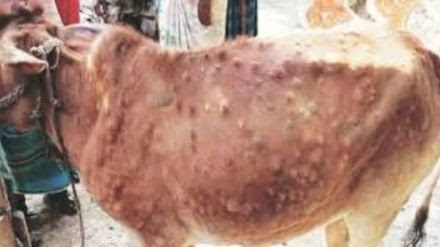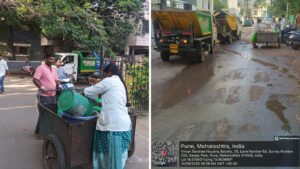Lumpy Skin Disease Resurfaces in Pimpri-Chinchwad: 12 Cases Reported, Authorities Spring into Action

Lumpy Skin Disease Resurfaces in Pimpri-Chinchwad: 12 Cases Reported, Authorities Spring into Action
The city’s livestock sector is facing a new health challenge as 12 animals have tested positive for Lumpy Skin Disease (LSD) in different parts of Pimpri-Chinchwad over the past ten days. This re-emergence of the viral infection has prompted immediate preventive measures by the Pimpri-Chinchwad Municipal Corporation (PCMC) and the state veterinary authorities.
Lumpy Skin Disease, caused by the Capripox virus, is known for its contagious nature and fast transmission through insect vectors like mosquitoes, biting flies, ticks, and midges. It can also spread through direct contact with infected animals and contaminated fodder or water sources.
Infected animals typically develop lumps or nodules on the skin, accompanied by high fever, swelling in limbs, nasal and ocular discharge, and in severe cases, lameness. One of the earliest signs is a reduction or complete loss of appetite, which in turn leads to lower milk production, severely affecting both dairy farmers and livestock owners.
As a critical first step to curb the spread, vaccination drives have been launched across affected areas, with 1,500 doses made available through the state government’s veterinary department. Special field teams have been deployed to monitor the situation, conduct checkups, and assist in isolating infected animals.
PCMC officials have advised livestock owners to take immediate action if any animal shows symptoms—particularly a sudden drop in food intake or signs of fever. Infected animals must be separated from healthy ones to prevent further transmission. Farmers have also been strongly discouraged from letting animals from affected villages graze in common pastures.
To tackle the insect-borne transmission of the virus, authorities have recommended the spraying of veterinary-approved insecticides, targeting common carriers like flies, mosquitoes, and ticks. All such preventive steps should be taken under veterinary guidance, officials said.
With over 2,400 domesticated animals including cows, buffaloes, bulls, horses, and even camels living in the Pimpri-Chinchwad region, the threat of a wider outbreak is significant. Though urban in nature, many areas within and around the city continue to rely heavily on animal husbandry, making vigilance and timely intervention all the more important.
Veterinary experts are confident that LSD can be controlled effectively if cases are identified early and proper care is administered. Timely vaccination and treatment, combined with strict hygiene and isolation protocols, are key to halting its spread. As the city works to contain the situation, PCMC has urged all livestock owners to stay alert, cooperate with veterinary teams, and report any suspicious symptoms without delay.









